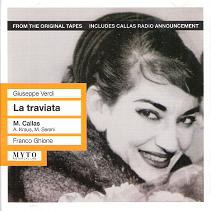La Traviata
豆瓣
简介
1958年里斯本不朽传奇名演。
CRITIC REVIEWS:
“This Lisbon presentation has acquired a legendary reputation. Although Callas’ vocal powers were already on the wane by 1958, her dramatic involvement and depth of interpretation were at a peak. And she was joined by the young Alfredo Kraus, already exhibiting the artistic and musical sensibilities that were to take him into the ranks of the finest tenors of his day. Sereni was a sympathetic and generally sensitive Germont….Numerous pirated copies have circulated. Possibly the worst of all was the one issued by EMI, in sound that was, at best, a travesty. It was hardly to be wondered if those of us forced to rely on that evidence tended to doubt the praise showered on the Lisbon performances….we now have this splendid Lisbon performance as a worthy memorial of a truly great artist, almost at the peak of her powers, in one of her finest roles.”
- Vivian A. Liff, AMERICAN RECORD GUIDE, Nov./Dec., 2005
“A leading lyric tenor of his generation, Alfredo Kraus parlayed his vocal and artistic gifts into one of the longest and best managed careers in recent memory. Always careful -- both in choice of roles and in the regulation of his performing schedule - not to overextend himself, he achieved a degree of consistency and longevity that kept him active professionally well into his sixties, always applauded for his youthful tone and delivery. Among his vocal assets were an admirable top extension - which included an enviable D above high C - a warm tone, and an instinctive feel for the shape of phrases, especially in French repertory. He, Carlo Bergonzi, and Nicolai Gedda were noted for their style, refinement, and musicianship in an era when, especially in Italian opera, tenors often neglected such qualities. He starred in the title role of Viladamot's 1959 film GAYARRE, a biography of the famous Spanish tenor.
While he studied music as a youngster, Kraus had no intention of becoming a professional singer, until friends and family began encouraging him to do so. In taking up vocal studies, Kraus avoided heavier repertory and focused on the bel canto ‘tenore di grazia’ parts that he knew were right for his voice. At the age of 28, he won first prize at the Geneva Competition, and a representative of the Cairo Opera, who was present at the auditions, offered him the role of the Duke in RIGOLETTO; he made his professional opera début at the Cairo Opera in that role in 1956. His great success there was followed by equally gratifying appearances in Venice, Turin, and Barcelona, and in 1958, he appeared in LA TRAVIATA with Maria Callas in Lisbon - the ‘Lisbon TRAVIATA’. In 1959, he sang Arturo in I PURITANI for the first time, made his La Scala and Covent Garden débuts, followed by his Metropolitan Opera début in 1965 and Salzburg début in 1968. In Rome, he sang his first WERTHER, a role that, like Arturo, was to become one of his signatures.
Aside from his fine sense of the musical nuance and phrasing, his portrayal of the mentally unstable, morbid, masochistic, and manipulative character of Werther has been acclaimed as one of the most effective and insightful readings ever. During the 1980s, he began to limit the number of his performances even further (at the peak of his career, he never sang more than 50 in a year), and started to turn his attention to teaching, although even in the 1990s he still had an active performing schedule. Kraus died on 10 September, 1999, after an extended illness.”
- allmusic.com